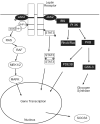Leptin and its role in hippocampal synaptic plasticity
- PMID: 16678906
- PMCID: PMC1762032
- DOI: 10.1016/j.plipres.2006.03.001
Leptin and its role in hippocampal synaptic plasticity
Abstract
It is well documented that the hormone leptin plays a pivotal role in regulating food intake and body weight via its hypothalamic actions. However, leptin receptors are expressed throughout the brain with high levels found in the hippocampus. Evidence is accumulating that leptin has widespread actions on CNS function and in particular learning and memory. Recent studies have demonstrated that leptin-deficient or-insensitive rodents have impairments in hippocampal synaptic plasticity and in spatial memory tasks performed in the Morris water maze. Moreover, direct administration of leptin into the brain facilitates hippocampal long-term potentiation (LTP), and improves memory performance in mice. There is also evidence that, at the cellular level, leptin has the capacity to convert hippocampal short-term potentiation (STP) into LTP, via enhancing NMDA receptor function. Recent data indicates that leptin can also induce a novel form of NMDA receptor-dependent hippocampal long-term depression. Here, we review the evidence implicating a key role for the hormone leptin in modulating hippocampal synaptic plasticity and discuss the role of lipid signaling cascades in this process.
Figures


References
-
- Maffei M, Halaas J, Ravussin E, Pratley RE, Lee GH, Zhang Y, Fei H, Kim S, Lallone R, Ranganathan S, et al. Nature Med. 1995;1:1155–61. - PubMed
-
- Considine RV, Sinha MK, Heiman ML, Kriauciunas A, Stephens TW, Nyce MR, Ohannesian JP, Marco CC, McKee LJ, Bauer TL, et al. N Engl J Med. 1996;334:292–5. - PubMed
-
- Jacob RJ, Dziura J, Medwick MB, Leone P, Caprio S, During M, Shulman GI, Sherwin RS. Diabetes. 1997;46:150–2. - PubMed
-
- Spiegelman BM, Flier JS. Cell. 2001;104:531–43. - PubMed
-
- Zhang Y, Proenca R, Maffei M, Barone M, Leopold L, Friedman JM. Nature. 1994;372:425–32. - PubMed
Publication types
MeSH terms
Substances
Grants and funding
LinkOut - more resources
Full Text Sources
Miscellaneous

